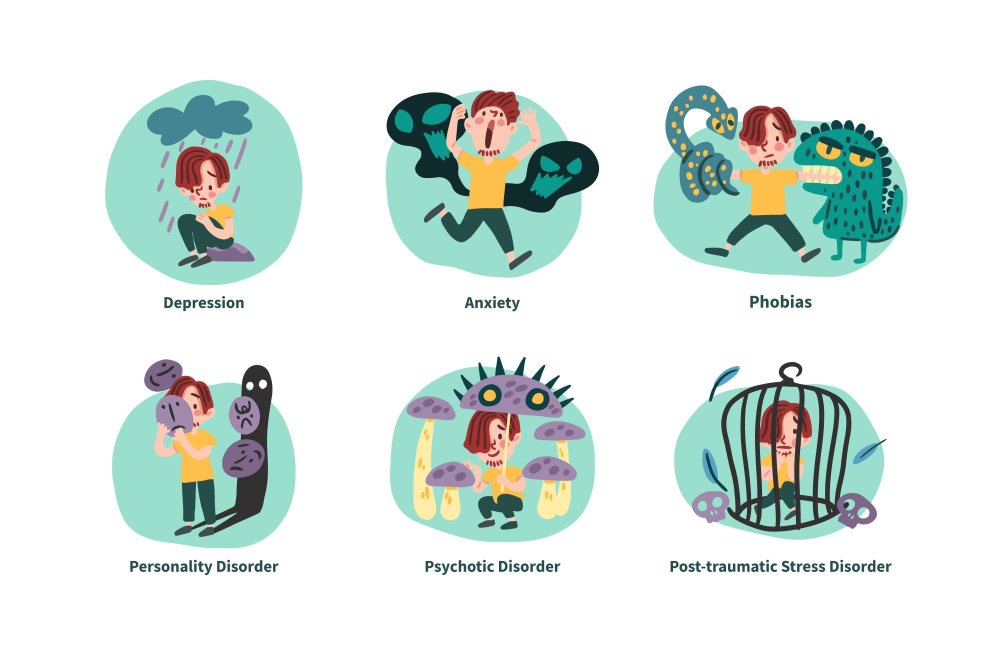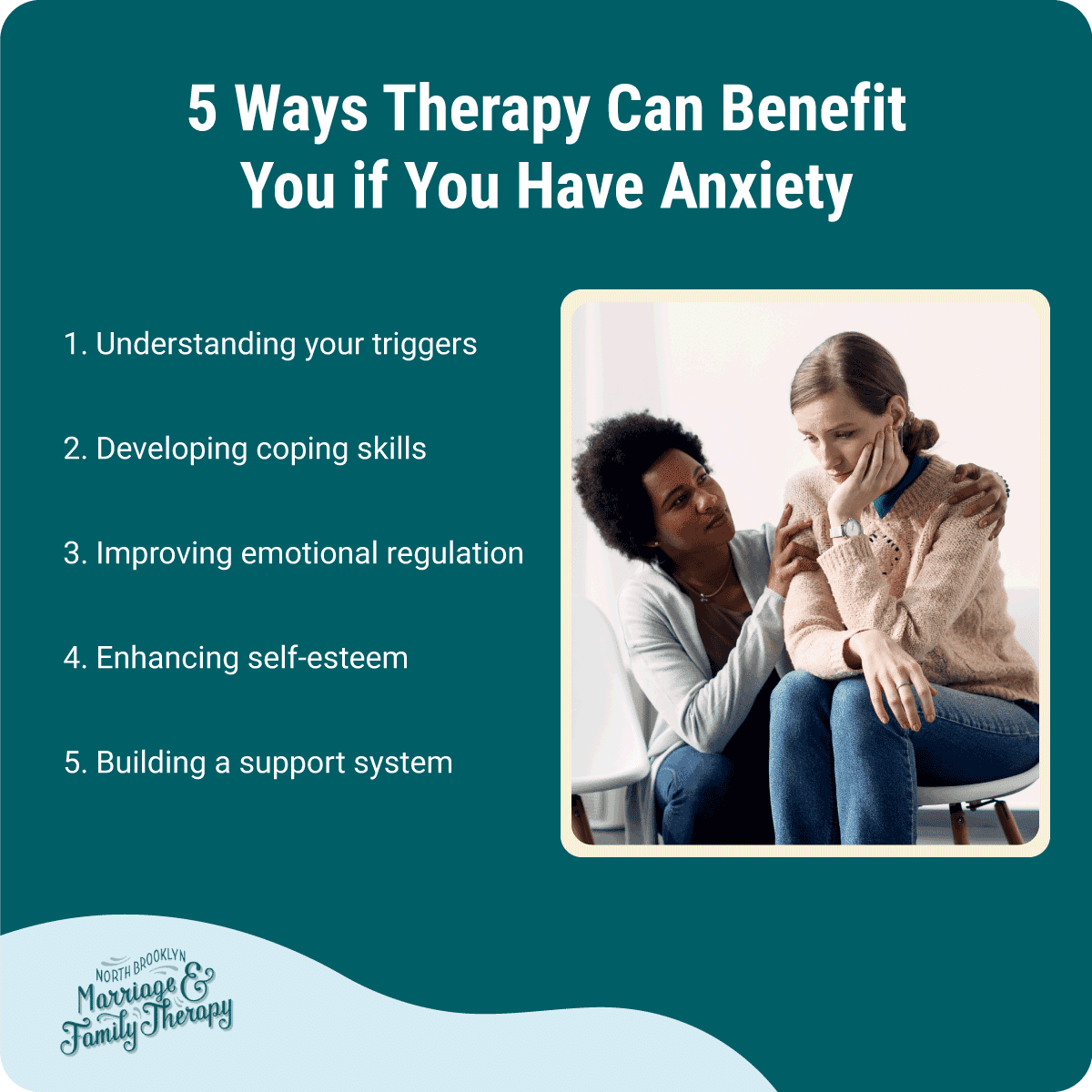Evidence-based counselling for anxiety with empathetic guidance
Evidence-based counselling for anxiety with empathetic guidance
Blog Article
Exploring Various Techniques in Counselling for Anxiety Condition for Lasting Modification
When tackling anxiety problems, it's important to discover a selection of therapy methods. Each technique offers distinct understandings and tools to help you handle your signs efficiently. You might discover that incorporating strategies can yield the ideal results. However, understanding the subtleties of these methods is key to fostering long-term modification. Suppose the best combination could launch a new degree of psychological wellness for you?
Recognizing Anxiety Problems: A Quick Review
Stress and anxiety disorders, which affect numerous people worldwide, can greatly influence every day life. You might experience overwhelming sensations of concern or fret that appear irrepressible. These sensations can bring about physical symptoms like a racing heart, sweating, or perhaps dizziness. Usual kinds of anxiety conditions include generalized stress and anxiety disorder, panic attack, and social anxiousness disorder. Each has unique indicators, however they all share a propensity to interrupt your regular and relationships.Understanding the source of your stress and anxiety is crucial. It might come from genes, brain chemistry, or life experiences. Acknowledging your triggers can aid you handle your feedbacks much better. It is essential to bear in mind that you're not the only one in this battle. Several individuals face similar challenges, and looking for help is a strong step toward feeling much better. By learning more about anxiousness disorders, you're already on the course to understanding and managing your condition extra properly.
Cognitive-Behavioral Treatment: Testing Negative Idea Patterns
In Cognitive-Behavioral Therapy, you'll start by identifying the adverse idea causes that add to your anxiousness. Counseling services for anxiety. When you acknowledge these thoughts, you'll work on replacing them with more favorable options. With each other, you'll build effective coping approaches to assist manage your anxiety in everyday circumstances

Identifying Unfavorable Thought Triggers
Identifying the details triggers behind your adverse ideas can be crucial in taking care of anxiousness when you encounter minutes of distress. Begin by taking note of circumstances that prompt feelings of worry or anxiety. Is it a jampacked room, an approaching deadline, or a discussion with particular individuals? Take down these instances in a journal. This will aid you recognize patterns in your thinking. Additionally, notice physical sensations that accompany your negative thoughts, like an auto racing heart or tightness in your chest. By determining these triggers, you acquire insight into what's sustaining your anxiousness. Recognizing these links is the primary step in challenging those ideas and eventually gaining back control over your emotional reactions.
Replacing Thoughts With Positives
Testing adverse idea patterns is an essential action in changing your mindset and reducing anxiousness. You might often discover on your own caught in cycles of self-doubt or disastrous thinking. As opposed to letting these thoughts dictate your sensations, technique replacing them with reasonable choices or positive affirmations. When you assume, "I can't handle this," shift it to, "I can take care of obstacles one step at a time." This basic change can greatly influence your emotional state. Frequently identifying and countering these adverse thoughts aids develop a healthier internal dialogue. Keep in mind, it takes time and effort, however consistently exercising this technique can cause long lasting modification, empowering you to face anxiety with restored confidence and resilience.
Structure Coping Strategies Together

Mindfulness and Acceptance-Based Approaches: Growing Present-Moment Understanding
As you navigate the complexities of stress and anxiety, integrating mindfulness and acceptance-based approaches can considerably enhance your capacity to grow present-moment recognition. By concentrating on the right here and now, you'll locate that you can observe your ideas and sensations without judgment. This practice aids you acknowledge your anxiety without feeling overwhelmed by it.Engaging in mindfulness exercises, such as deep breathing, body scans, or led reflections, enables you to ground yourself in your present experience. Acceptance-based techniques encourage you to welcome your feelings rather than battle against them. When you accept your sensations, they shed their power over you.Incorporating these methods right into your everyday routine can change exactly how you react to anxiety. You'll create resilience and find out to navigate demanding scenarios with better simplicity. Ultimately, cultivating present-moment awareness lays the foundation for enduring change, encouraging you to lead a more meeting life.
Direct Exposure Treatment: Facing Anxieties Slowly
Direct exposure therapy helps you challenge your worries in a steady way, making it much less frustrating. You'll learn methods to face anxiety-provoking circumstances detailed, while also constructing coping methods to handle your reactions (Counseling services for anxiety). This strategy empowers you to take control and minimize anxiousness over time
Gradual Direct Exposure Strategies
When facing stress and anxiety, progressively confronting your anxieties can be a powerful method to reclaim control. This technique, referred to as gradual exposure, entails gradually exposing yourself to the circumstances or things that trigger your stress and anxiety. Begin with much less challenging scenarios and gradually work your method as much as even more tough ones. For example, if you're worried of public talking, you might begin by talking before a mirror, after that advance to sharing thoughts with a buddy, and eventually resolve a little team. Discover More Here Each step helps desensitize you to the fear, building your confidence in time. Keep in mind, it's crucial to pace on your own and celebrate little victories as you move through this procedure, reinforcing your ability to take care of anxiety efficiently.
Structure Coping Techniques
Structure reliable coping methods is crucial for managing anxiety, specifically as you challenge your worries slowly. One effective method is direct exposure treatment, where you start by facing your anxieties in a controlled manner. Start with less intimidating situations and slowly function your way as much as more challenging scenarios. This steady exposure aids desensitize you to stress and anxiety activates, making them less overwhelming.Incorporate relaxation strategies, such as deep breathing or mindfulness, to soothe your mind during direct exposure. Track your progress, commemorating little victories along the road to increase your self-confidence. Remember, it's all right to take your time; click to read more the goal isn't perfection but constant enhancement. By constructing these methods, you'll empower yourself to browse anxiety and accept life more completely.
Psychodynamic Treatment: Revealing Origin of Stress And Anxiety
Psychodynamic treatment explores the unconscious mind, disclosing the source of your anxiety. By examining your ideas, sensations, and previous experiences, this method aids you uncover underlying disputes and unresolved problems that might contribute to your existing anxiety. You'll collaborate with a specialist see here to investigate childhood experiences, relationships, and emotional patterns that form your reactions today.As you get insight into these deeper layers of your mind, you'll begin to recognize just how past events influence your existing behavior. This understanding can bring about catharsis, enabling you to refine feelings you could have suppressed.Through the therapeutic connection, you can additionally recognize defense mechanisms that may have established over time, providing a clearer course to alter. Inevitably, psychodynamic therapy furnishes you with the devices to resolve your anxiousness at its core, advertising enduring change in your emotional wellness.
Integrative and Alternative Approaches: Incorporating Strategies for Greater Efficiency
Incorporating different therapeutic methods can enhance your journey toward taking care of anxiousness better (Counseling services for anxiety). By integrating elements from cognitive-behavioral therapy, mindfulness techniques, and all natural methods, you can create a customized technique that addresses your distinct requirements. You might use cognitive-behavioral methods to challenge negative idea patterns while integrating mindfulness workouts to ground on your own in the present moment.Additionally, exploring holistic methods such as yoga or reflection can advertise relaxation and lower anxiousness signs. This blend enables you to develop better self-awareness and resilience.Experimenting with these varied techniques can help you find what reverberates most with you. Bear in mind, it has to do with locating a synergy that functions, instead of adhering to a single strategy. This integrative method not only uses immediate alleviation however also promotes long-term skills for taking care of stress and anxiety, equipping you to reclaim control over your life

The Function of Support Equipments: Structure Strength Through Link
While it may seem that taking care of stress and anxiety is a singular trip, having a solid support group can play a crucial function in your resilience. Surrounding on your own with empathetic good friends, family, or assistance groups develops a safe space where you can freely share your experiences and feelings. You remind on your own that you're not alone in this struggle.These partnerships supply encouragement and can provide functional coping strategies that have worked for others when you connect with others. It's also a chance to acquire viewpoint; close friends can help you see situations differently, reducing sensations of isolation.Moreover, emotional assistance cultivates a feeling of belonging, which can substantially relieve stress and anxiety signs. By leaning on your assistance system, you can develop resilience and tackle difficulties better. Keep in mind, connecting for help is an indication of stamina, and it can make all the difference in your journey towards handling stress and anxiety.
Regularly Asked Questions

What Are the Common Signs And Symptoms of Anxiousness Conditions?
You might experience restlessness, tiredness, difficulty concentrating, irritation, muscle stress, and rest disturbances. Physical signs can include quick heartbeat, sweating, and shivering. Acknowledging these signs early can help you look for proper assistance and treatment.
How Much Time Does Therapy Usually Last for Stress And Anxiety Conditions?
Therapy for anxiety conditions typically lasts anywhere from a couple of weeks to several months. It truly depends upon your individual needs, development, and the methods your therapist utilizes to help you manage your anxiousness effectively.
Can Medication Be Used Alongside Therapy for Stress and anxiety?
Yes, drug can definitely be made use of along with treatment for anxiousness. Incorporating both strategies often enhances therapy performance, assisting you take care of signs and symptoms while checking out underlying problems through counseling. Constantly consult your medical care copyright for personalized suggestions.
Exist Self-Help Methods for Managing Anxiety?
Yes, there are numerous self-help techniques for taking care of anxiety. You can practice mindfulness, participate in routine exercise, maintain a well balanced diet plan, establish a regular, and use deep breathing techniques to help in reducing stress and anxiety symptoms properly.
Exactly how Do I Know if I Need Professional Assistance for Anxiousness?
You need to consider looking for professional help for anxiety if it interferes with everyday life, creates considerable distress, or if self-help strategies aren't working. Depend on your instincts; getting to out can lead to far better coping abilities and support. Common kinds of anxiety problems include generalized anxiousness disorder, panic problem, and social stress and anxiety problem. When you encounter moments of distress, identifying the particular triggers behind your adverse thoughts can be crucial in managing anxiousness. Replacing adverse thoughts is only the start of managing stress and anxiety effectively. By examining your ideas, sensations, and past experiences, this method aids you uncover underlying disputes and unsolved problems that might contribute to your existing anxiety. It's also a possibility to obtain perspective; good friends can aid you see situations in different ways, minimizing sensations of isolation.Moreover, emotional assistance cultivates a feeling of belonging, which can greatly ease anxiousness symptoms.
Report this page